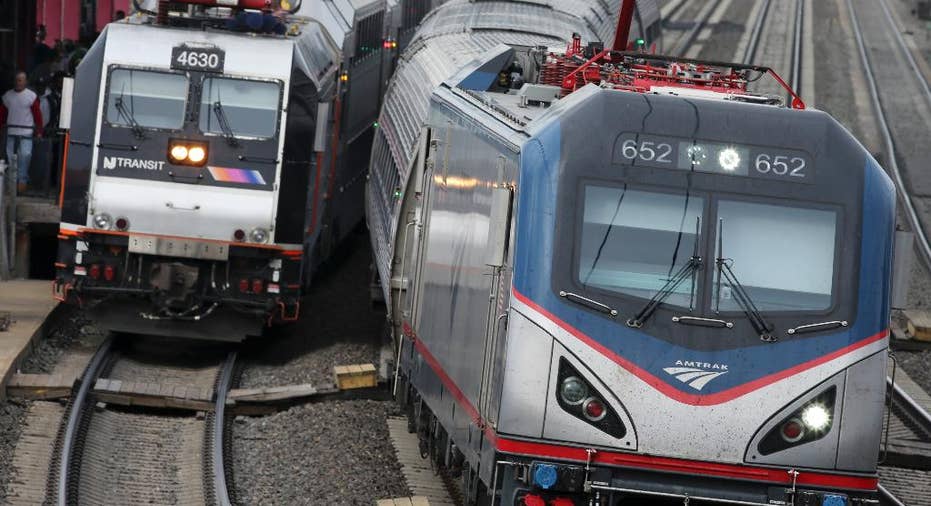Feds back ambitious plan to speed up Northeast rail service

PHILADELPHIA – Federal railroad regulators endorsed an ambitious and costly plan to rebuild the congested Northeast Corridor over the next 30 years by shoring up crumbling infrastructure, running more trains and building new tracks that would allow speeds of up to 220 mph on a stretch of the Washington-Boston route.
The Federal Railroad Administration's plan unveiled Friday aims to cut down on delay-causing bottlenecks and increase capacity and reliability by upgrading outdated bridges and tunnels — including ones into New York City that are more than a century old — and realigning tracks to eliminate speed-restricting curves.
The FRA estimates the $120 billion plan would cut travel times between Washington and New York by 35 minutes, to about 2 hours and 10 minutes, on the fastest trains and save 45 minutes to an hour on trips between Boston and New York, which now take close to 4 hours.
Amtrak's Stephen Gardner, who's in charge of business operations on the corridor, said the plan affirms the railroad's "long-held view that rebuilding and expanding the Northeast Corridor is essential for the growth and prosperity of the entire region."
The FRA's plan is the first comprehensive look at the future of the 500-mile corridor, which handles about 2,200 trains and 750,000 passengers each day on commuter and intercity trains. The agency said it's the product of a four-year process that sought input from state and local officials and residents, as well as Amtrak and commuter railroads.
Now it's up to the states, railroads and President-elect Donald Trump to give their approvals and figure out which aspects of the plan to prioritize.
Not everyone is on board.
Sen. Richard Blumenthal declared a part of the plan calling for new tracks from Old Saybrook, Connecticut, to Rhode Island "dead on arrival," even after the FRA opted to recommend a tunnel instead of elevated tracks through the historic town of Old Lyme. He contends the plan will still devastate neighborhoods, marshlands, commercial districts and tourist attractions along the state's southeastern Connecticut shoreline.
Blumenthal, D-Conn., questioned the project's environmental and quality-of-life impacts on those communities, as well as the cost. Rep. Joe Courtney, also a Democrat, said one estimate put the proposed tunnel's cost at $20 billion, leaving local activists concerned that cheaper above-ground tracks could still be built. They're also worried the tunnel could harm the environment.
Matthew Lehner, public affairs director for the FRA, said that Friday's recommendation is just one step in the process and that construction couldn't begin on any aspect of the plan without the support and agreement of state leaders.
Elsewhere, work has begun on some projects incorporated into the FRA's plan. They include a $20 billion project to build new, expanded tunnels under the Hudson River between New York and New Jersey and a $4 billion project to replace a 143-year-old tunnel in Baltimore.
Among other provisions in the plan: a new Amtrak stop at Philadelphia's airport, eliminating the need for some travelers to reach the city and switch to a commuter train; increased service to parts of southern New England; and a new level of service that makes stops at a variety of commuter rail stations and major city hubs. Straighter tracks would enable trains to reach 220 mph between Baltimore and Wilmington, Delaware. The fastest trains on the system currently top out at 150 mph, with a project underway to boost that to 160 mph near Trenton, New Jersey.
U.S. Sen. Cory Booker, D-N.J., said implementing the FRA's plan is vital to the growth of the region, which is expected to add 7 million people by 2040. Currently, the Northeast is responsible for about 30 percent of the nation's jobs and 20 percent of its gross domestic product, according to federal data.
"They recognize that the Northeast Corridor is not adequate for today and is not an adequate transportation pathway for tomorrow," Booker said. "The fact that we're choking growth and productivity is unacceptable."
___
Associated Press writer Susan Haigh in Hartford, Connecticut, contributed to this report.



















